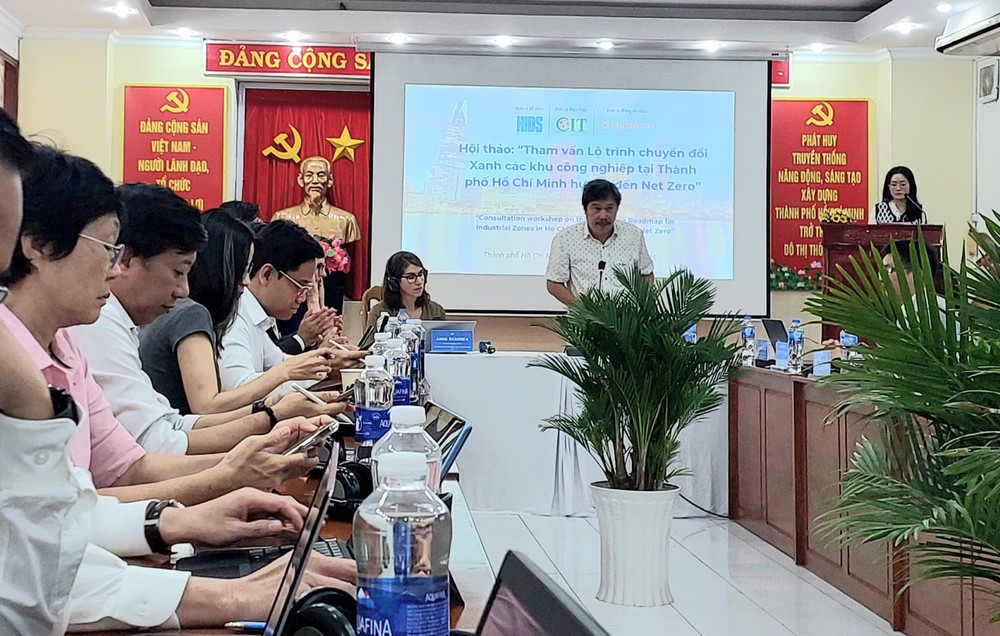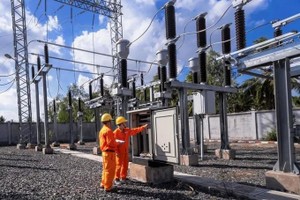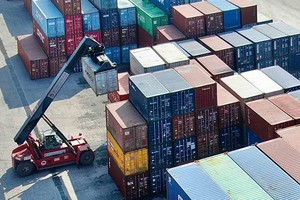Ho Chi Minh City’s Institute for Development Studies (HIDS), in partnership with the Climateworks Center at Monash University (Australia), hosted a workshop yesterday to consult on a strategic roadmap for greening the city’s industrial parks (IPs) in pursuit of net zero emissions.

During the event, Head Tran Van Bich of HIDS’s Economic Development Research Department presented findings from a survey conducted at Binh Chieu Industrial Park which is one of five IPs selected for the city’s pilot green transition program. The survey revealed that approximately 50 percent of enterprises in the park are still operating with outdated technology, while the remainder use either standard or moderately advanced systems.
Binh Chieu Industrial Park -the smallest among Ho Chi Minh City's industrial parks with an area of 27.34 hectares- is situated within a residential zone. More than 50 percent of its land area has either reached or is nearing the end of its lease term, presenting favorable conditions for restructuring and green conversion.
According to the draft transformation plan, Binh Chieu Industrial Park will undergo phased redevelopment focusing on digital transformation, green technologies, and the circular economy. The roadmap includes policy measures to support both businesses and workers during the transition. The city aims to complete the initial conversion of the park by 2030 and achieve full green transformation including carbon emission reductions by 2045.
By 2045, the park is expected to adopt a new model emphasizing high-rise factories, high-tech industries, supporting industries for the high-tech sector, logistics operations, and mixed-use buildings offering accommodation and commercial services. Post-2045, the site will transition further into industrial services such as logistics, cold storage, commercial centers, product showrooms, education, healthcare, and mixed-use residential-commercial facilities.
To support businesses affected by relocation, the Ho Chi Minh City Institute for Development Studies has announced plans to allocate new land resources, provide credit assistance and low-interest loans, cover relocation expenses and offer worker compensation packages for job discontinuation.
Drawing from the experience of developing an ecological industrial park model at Hiep Phuoc Industrial Park, a representative from the Ho Chi Minh City Management Board of Exporting Processing and Industrial Zones aknowledged that the green transformation process continues to face significant hurdles particularly in legal frameworks, financing, and workforce readiness.
Recent survey results carried out by the Saigon Hi-Tech Park (SHTP) indicate that energy efficiency and energy transition remain the top priorities for most businesses with 69 percent of respondents identifying these as key to sustainable development.
Experts are advocating for a more comprehensive approach to sustainability, emphasizing the critical role of greenhouse gas inventory systems, water recycling, and material reuse. This broader perspective contrasts with the common business focus on immediate operational costs and energy consumption. The disparity underscores a key challenge that businesses often prioritize short-term gains while experts champion long-term and systemic solutions. Reconciling these different viewpoints is essential for developing a dual transformation strategy that is both practical and sustainable for the future.
CEO Anna Skarbek of the Climateworks Center stressed that transforming Ho Chi Minh City’s industrial parks into Net Zero Industrial Parks (NZIPs) is vital for expanding market access and ensuring future competitiveness in global exports.
Australian Consul General in Ho Chi Minh City Sarah Hooper reinforced Australia’s commitment to Net Zero by 2050. She noted that Australia has created a dedicated Net Zero agency and a Southeast Asia energy strategy to foster regional cooperation. According to Australian Consul General Hooper, establishing NZIPs is essential for attracting new investment and positioning Ho Chi Minh City as a leading hub in the regional economy.
Director Trang Nguyen of International Programs and Cooperation at the Climateworks Center pointed out that Ho Chi Minh City has a unique opportunity to pilot the NZIP model through practical, scalable solutions. These include accelerating the adoption of renewable energy and electrification processes in emission-intensive sectors such as steel, textiles, and plastics.
The Climateworks Center also recommended forming a dedicated city-level coordination body to guide industrial transformation, combining energy solutions with green skills training, export promotion, and green investment attraction.
This strategic cooperation between the Ho Chi Minh City Institute for Development Studies and the Climateworks Center was formalized through an agreement signed at the Ho Chi Minh City Economic Forum in 2024.
























